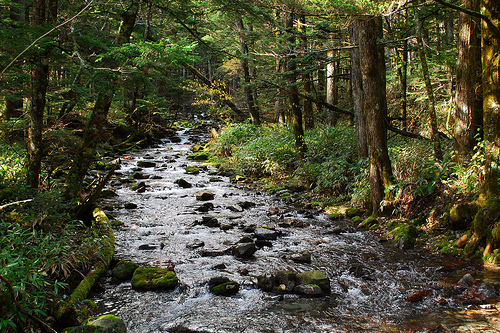Water
Who's responsibility is it to protect water resources? Local governments implement measures against foreign investment
2012.02.16 Yumi Yamada

Kamikochi:Creative Commons,Some Rights Reserved,Photo by decade_null
The global battle to secure water resources is becoming more and more intense. Here, in Japan, too, properties near sources of water are being bought up by foreign investment. So local governments have begun to implement measures to help preserve the nation's precious water supply.
The largest case example of such a land purchase was seen in Hokkaido last year (pdf). That is why the prefecture has contemplated the enforcement of a legislation, which would help it protect its water resources. Saitama prefecture, too, announced on February 7 that it will submit a similar legislation to the prefectural assembly, which would allow it to protect its water supply by obligating the prior submission by owners of forests of any potential transactions to be made on properties containing water resources. And on the following day, Gunma prefecture made it clear that it will push forward with the enactment of a similar legislation.
Currently, the use of groundwater is regulated by the "Industrial Water Act" and the "Building Water Act" (short for the Law Concerning the Regulation of Pumping-up of Groundwater for Use in Buildings), but the right to use groundwater lies with the owner of the property. As long as the owner is not in violation of the above laws and the legislations enacted by the local governments, they can use the water as they wish. So in the worst-case scenario, they are free to pump up and sell as much groundwater as they want to. Surveys revealed that the purchaser or the purpose of purchase for some of the properties was unclear, that is why local governments have decided to intervene.
Although these measures cannot directly restrain land transactions, but sales of land to dummy corporations and other unsound transactions may be prevented with the administration stepping in to keep track of the transactions. Although these legislations may only serve as a deterrent, it would be very hard to buy back the land once it has been sold to an unknown individual or corporation.
There have been countless discussions on whether groundwater is public or private property. But fears that groundwater, which has been cultivated over a long period of time, would be abused have spread to individuals and across governments. For the first time, prefectural governments have decided to implement measures. There are people who say, "Isn't it too late?" "Would it be effective?" or "What about the national government?" But as a result of such efforts, people are becoming increasingly aware of the "precious, unseen water" that lies deep underground.
Related URL/media
http://www.nhk.or.jp/nagano/eve/hatena/2011/110822.html
![]()









